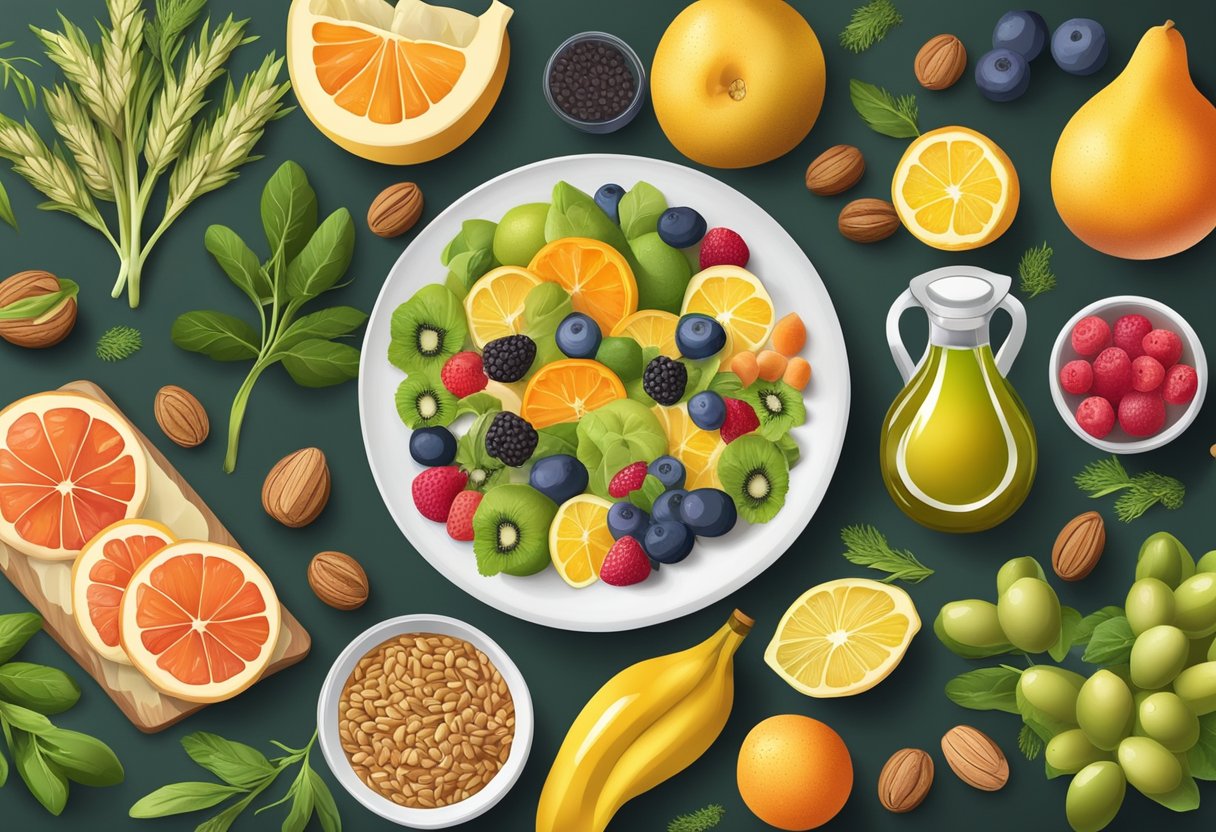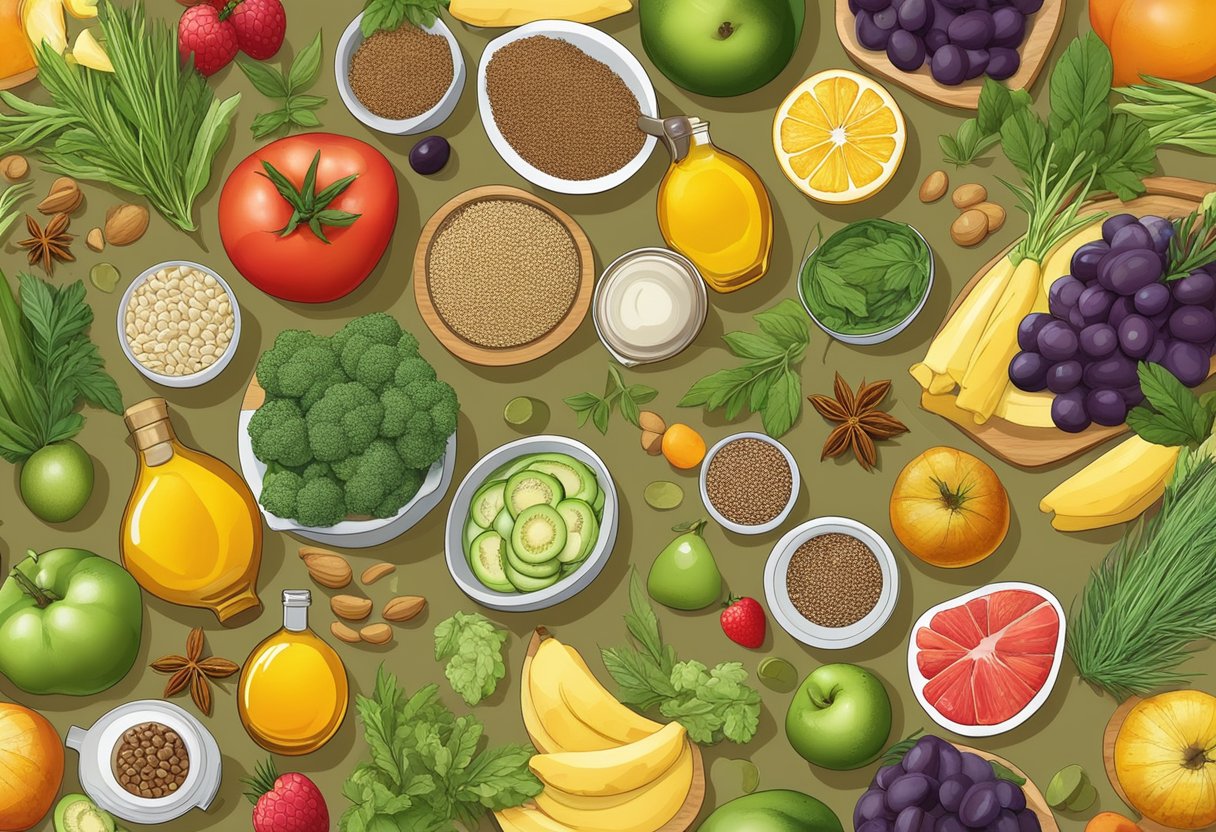Embracing the Mediterranean diet represents a time-tested approach to balanced eating that emphasizes freshness, variety, and nutrition. Characterized by an abundance of vegetables, fruits, whole grains, and healthy fats, such as extra-virgin olive oil, nuts, and seeds, this dietary pattern is designed to promote well-being and longevity. It’s not only about what is on the plate, but also how meals are composed and appreciated. The Mediterranean lifestyle underscores the importance of meal timing and composition, ensuring each dish provides a symphony of flavors and nutrients, often punctuated with a sense of community and enjoyment.

Integrating a gluten-free approach into the Mediterranean diet is seamless, as it naturally contains a variety of gluten-free foods. Instead of focusing on wheat-based pastas and breads, meals pivot towards other whole grains like quinoa, buckwheat, and brown rice that fit both the Mediterranean profile and gluten-free requirements. This adaptation does not compromise the essence of the diet but rather enhances its inclusivity and flexibility. It allows those with gluten sensitivity to enjoy the full spectrum of Mediterranean dishes, from vibrant salads and hearty legumes to grilled seafood and lean proteins, without concern.
Key Takeaways
- The Mediterranean diet focuses on whole foods and heart-healthy fats.
- Gluten-free adaptations to the diet are naturally accommodated with abundant alternatives.
- Meal timing and enjoyment are as pivotal to the diet as the ingredients used.
Table of Contents
Essentials of the Mediterranean Diet
The Mediterranean diet emphasizes a balanced approach to eating, focusing on whole, unprocessed foods that are naturally gluten-free. It is recognized for its potential to support overall health and longevity.
Core Components
Fruits and Vegetables: They form the foundation of the diet, providing a wide array of vitamins, minerals, and fiber. They should be consumed in abundance daily.
Whole Grains: In their gluten-free forms, such as quinoa and brown rice, whole grains are an essential aspect of the diet, offering necessary fiber and nutrients.
Nuts and Legumes: These provide healthy fats, protein, and fiber, and are often included in meals instead of meat.
Olive Oil: A staple for cooking and dressings, olive oil replaces other fats and is key to heart health due to its high monounsaturated fat content.
Lean Proteins: The focus is on lean options like fish which is consumed often, while poultry and fermented dairy, such as yogurt, are eaten in moderation.
Herbs and Spices: These are used for seasoning instead of salt, enriching flavors while contributing health benefits.
Health Benefits
Heart Disease: The diet is renowned for its cardiovascular benefits, including reducing the risk of heart disease.
Diabetes and Stroke: By prioritizing blood sugar control through a high intake of fiber and whole foods, the risk of type 2 diabetes and stroke is potentially lowered.
Cancer: The antioxidants found in the fruits, vegetables, and olive oil are thought to contribute to a reduced risk of certain types of cancer.
Weight Management and Longevity: With a balance of nutrient-dense and satiating foods, the Mediterranean diet supports healthy weight management and may be linked to increased longevity.
The diet’s emphasis on plant-based foods, heart-healthy fats, and lean proteins, combined with the minimal presence of processed foods and sugars, contributes to these far-reaching health impacts.
Nutritional Strategies

Adopting a gluten-free Mediterranean diet focuses on balancing macronutrients and understanding the role of calories and portions. This strategic approach ensures that each meal is both nutritionally complete and aligned with dietary needs.
Balancing Macronutrients
The Mediterranean diet emphasizes a balance between proteins, carbohydrates, and healthy fats. Each macronutrient plays a critical role:
- Proteins: Essential for muscle and tissue repair, sources like fish and legumes are prioritized to support a gluten-free regimen.
- Carbohydrates: Emphasis is placed on gluten-free whole grains, fruits, and vegetables, providing fiber and energy.
- Fats: Focusing on healthy fats, such as those found in olive oil and nuts, supports heart health and satiety.
Understanding Calories and Portions
Calorie intake should align with individual energy needs, which can be managed through:
- Portion Control: Eating in moderation to avoid excessive calories while still enjoying a variety of foods.
- Caloric Density: Choosing foods that are lower in calories yet high in nutrients, like leafy greens and brightly colored vegetables, supports both weight management and a robust nutrient profile.
Meal Composition and Timing

Balancing meals the Mediterranean way emphasizes a diverse and nutrient-rich intake from the start of the day to the end. It includes a focus on gluten-free whole grains, fruits, and healthy fats, with careful timing to sustain energy levels.
Breakfast Choices
The first meal of the day sets the tone for energy and nutrition. A gluten-free Mediterranean breakfast might include:
- Oatmeal: A warm bowl of gluten-free oatmeal topped with sliced fruits and a handful of nuts for added protein and healthy fats.
- Greek Yogurt: A serving of Greek yogurt with fruit and a drizzle of extra virgin olive oil can offer a balance of protein and heart-healthy fats.
Lunch Options
Lunch is an opportunity to incorporate a variety of vegetables and lean proteins. Typical lunch options include:
- Salads: A large salad with mixed greens, tomatoes, and other seasonal vegetables, dressed with extra virgin olive oil.
- Quinoa or Brown Rice: A base of gluten-free whole grains like quinoa or brown rice accompanied by grilled seafood or poultry and fresh vegetables.
Dinner Ideas
Dinner on the Mediterranean diet is a lighter meal but still full of nutrients. Gluten-free dinner ideas often feature:
- Seafood: Grilled or baked fish seasoned with herbs and served with a side of vegetables sautéed in extra virgin olive oil.
- Vegetable Stir-Fry: A stir-fry with an assortment of fresh vegetables, such as bell peppers and zucchini, tossed with gluten-free tamari sauce and served over quinoa or brown rice.
Between meals, snacks consisting of fresh fruit, a small portion of nuts, or a salad can help maintain energy levels throughout the day, adhering closely to a gluten-free Mediterranean meal plan.
Building Flavor and Variety

In a gluten-free Mediterranean diet, the focus is on enhancing meals with herbs and spices while experimenting with a variety of recipes. Flavor is not compromised; rather, it is celebrated through creative combinations and cooking techniques.
Utilizing Herbs and Spices
Herbs such as basil, rosemary, and oregano infuse dishes with distinctive Mediterranean aromas that elevate the dish’s flavor profile. Garlic is indispensable in regional cooking, offering a robust foundation for both simple and complex recipes. These herbs can be used fresh or dried, with fresh providing a more vibrant taste.
Gluten-free dishes gain depth from a myriad of spices. For instance, cinnamon can be incorporated into gluten-free desserts or even savory seafood dishes for an unexpected twist. A pantry well-stocked with such spices ensures that gluten-free meals remain exciting and delicious.
| Herbs | Use with |
|---|---|
| Basil | Pasta, Salads |
| Rosemary | Roasted Meats, Vegetables |
| Oregano | Fish, Pizza (gluten-free base) |
Experimenting with Recipes
They can enjoy traditional pasta dishes using gluten-free alternatives made from rice, corn, or legume flours. Emphasizing fresh and high-quality ingredients translates to flavorful plates that are both nutritious and satisfying.
Seafood recipes offer an excellent opportunity to combine herbs and spices in new ways, with grilled fish being a perfect canvas for experimentation. One can pair bold flavors or stick to simple citrus and herb marinades to highlight the natural taste of the seafood.
The diversity of the Mediterranean diet allows for a rich selection of gluten-free desserts. Incorporating spices like cinnamon into fruit dishes or creating herb-infused olive oil cakes provides a delightful finish to any meal while adhering to dietary needs.
Healthy Practices Outside Eating

Adopting the Mediterranean lifestyle extends beyond the plate, focusing equally on enhancing one’s overall wellbeing through regular physical activity and informed hydration choices, especially crucial in a gluten-free diet where maintaining energy levels and digestive health is key.
Incorporating Physical Activity
One should aim to blend moderate physical activity into their daily routine, much like the residents of Mediterranean regions who often engage in walking, gardening, or cycling. They may also incorporate practices such as yoga or pilates, which support flexibility and core strength. Such activities are not only beneficial for cardiovascular health but also aid in maintaining a healthy weight and managing stress, aligning perfectly with a gluten-free Mediterranean lifestyle.
Hydration and Beverage Choices
Hydration is paramount; individuals are advised to drink ample water throughout the day, which is crucial for digestion—especially on a gluten-free diet where fiber intake may vary. Besides water, one can enjoy beverages like tea, which offers antioxidants, or a moderate intake of red wine, associated with the traditional Mediterranean diet’s benefits. The key is to make choices that support hydration without excessive sugar or calories.
When considering the gluten-free Mediterranean diet, it is essential to remember that balancing nutrients and lifestyle practices leads to the best health outcomes.
Shopping and Meal Preparation

Embarking on a gluten-free Mediterranean journey requires strategic shopping and meal preparation. One must stock their pantry with gluten-free staples and plan meals that align with the diet’s emphasis on whole, nutrient-rich foods.
Crafting a Mediterranean Pantry
A well-stocked pantry is the cornerstone of successful meal planning. Individuals should focus on gluten-free grains such as quinoa and brown rice. It’s also essential to have a variety of seeds, including flaxseeds and sunflower seeds. Another key ingredient is high-quality olive oil, known for its heart-healthy fats.
- Grains: Quinoa, brown rice, buckwheat
- Seeds: Flaxseeds, sunflower seeds, pumpkin seeds
- Oils: Extra virgin olive oil
Preparing Meals Ahead
Batch cooking is a practical approach that ensures adherence to a gluten-free Mediterranean diet. By preparing meals ahead of time, they save time throughout the week. Cooking large quantities of grains and incorporating seeds for added nutrients makes meal assembly quick and effortless. Storing these meals properly is crucial for maintaining freshness.
- Meal Preparation: Large quantities of gluten-free grains and legumes
- Storage: Airtight containers to keep ingredients fresh
By concentrating on a meal plan that incorporates these gluten-free options and utilizing shopping lists to procure the necessary ingredients, one can effectively balance their meals the Mediterranean way. Each meal should provide a tapestry of tastes and health benefits, aligned with the dietary patterns of the Mediterranean.
Frequently Asked Questions
The Mediterranean diet, often highlighted for its health benefits, seamlessly fits into a gluten-free lifestyle. Here are some specific inquiries often made about this wholesome approach to eating.
What are the essential components of a balanced Mediterranean diet?
A balanced Mediterranean diet is rich in vegetables, fruits, whole grains, lean proteins, and healthy fats. Specifically, it emphasizes gluten-free whole grains like quinoa and brown rice, lean proteins such as fish and legumes, and fats from sources like olives and nuts.
How can one integrate the Mediterranean diet into a weekly meal plan?
Incorporating the Mediterranean diet into a weekly meal plan can involve choosing gluten-free grains for meals, opting for lean protein like fish several times a week, and featuring a variety of vegetables and fruits. Meal planning should revolve around plant-based foods with moderate amounts of dairy and poultry.
What are some simple Mediterranean diet recipes for beginners?
Starters might try simple recipes such as Greek salad with quinoa, grilled vegetables with a tahini dressing, or lentil soup with gluten-free bread. These recipes are straightforward and embrace the diet’s core principles.
Which foods should be avoided or limited in a Mediterranean diet?
Foods to avoid or limit on a Mediterranean diet, particularly a gluten-free variant, include red meats, processed foods, refined oils, and any items containing gluten such as certain breads, pastas, and cereals.
Can you provide a sample 7-day Mediterranean diet meal plan?
A sample 7-day Mediterranean diet meal plan might include dishes like grilled fish with a side of mixed greens for dinner, chickpea salad with an abundance of fresh vegetables for lunch, and for breakfast, an omelet with spinach and feta. Each day should feature a variety of gluten-free grains, fruits, vegetables, and legumes.
How does the Mediterranean diet rank in comparison to other health diets?
The Mediterranean diet is frequently ranked among the top diets for its evidence-based benefits in heart health, weight management, and chronic disease prevention. It is often considered more sustainable and enjoyable compared to other diets, partly due to its allowance for a wide range of foods and flavors.



